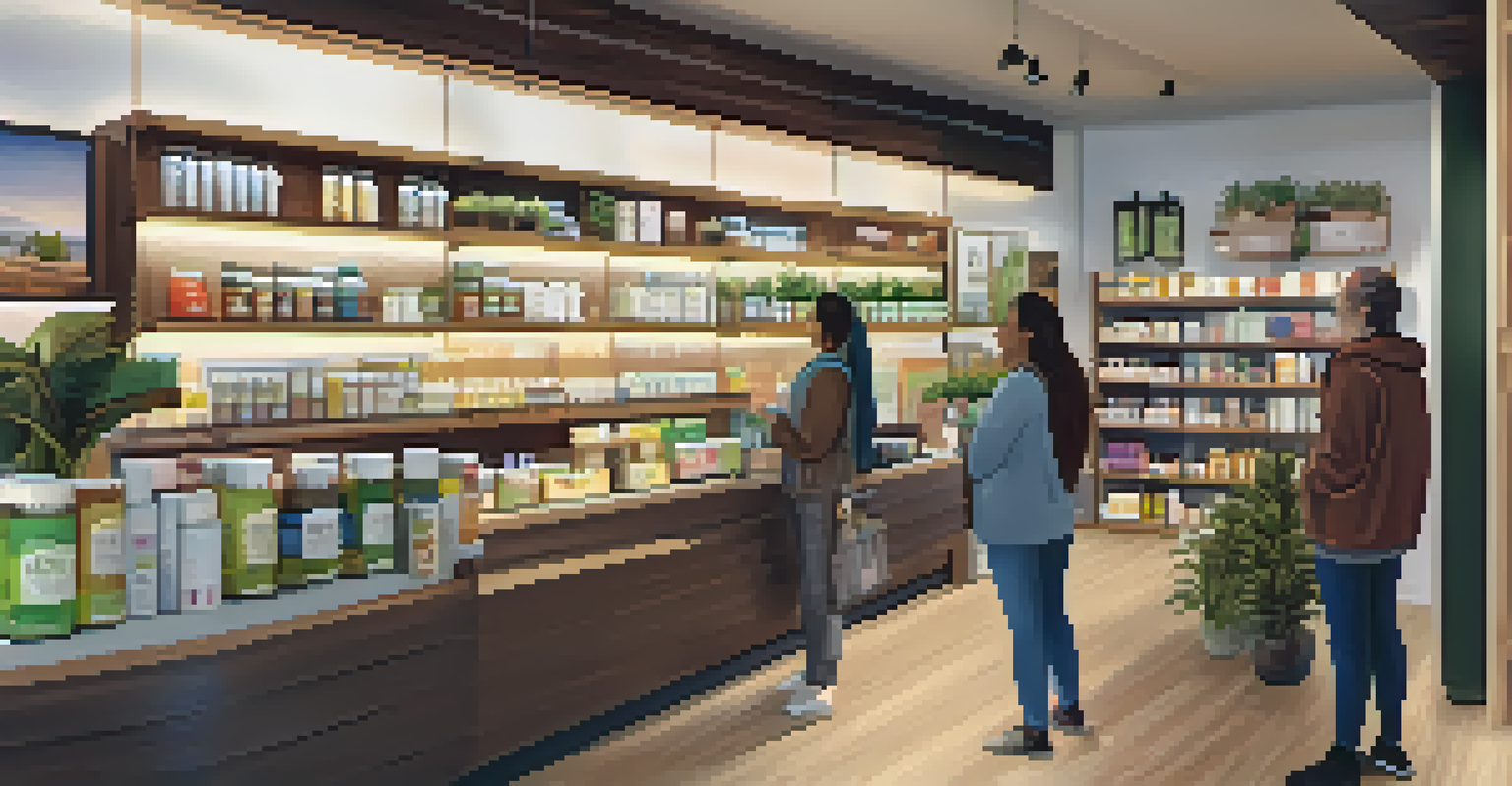Exploring the Popularity of CBD Products in Retail Markets

What is CBD and Why is it Gaining Popularity?
CBD, short for cannabidiol, is a natural compound found in hemp and cannabis plants. Unlike THC, CBD doesn’t produce a high, making it appealing for those seeking health benefits without psychoactive effects. This unique property has ignited interest in CBD products across various sectors.
The future of CBD products in retail markets looks bright, with trends indicating sustained growth.
Moreover, as more research emerges highlighting the potential therapeutic benefits of CBD, such as reducing anxiety and inflammation, consumers are eager to explore these options. This growing body of evidence boosts confidence and curiosity about CBD's uses in everyday life.
As a result, CBD-infused products, from oils to edibles, have become staples in health and wellness stores. The blend of natural ingredients and perceived health benefits creates a compelling case for consumers seeking alternatives to traditional remedies.
The Role of Retailers in Popularizing CBD Products
Retailers play a crucial role in bringing CBD products to the mainstream. By stocking a variety of items, from oils to skincare, they cater to diverse consumer preferences and needs. This wide availability makes it easier for customers to access and try CBD without the stigma often associated with cannabis.

Additionally, retailers often provide education on CBD, helping demystify the product for potential buyers. Informative labels, knowledgeable staff, and in-store promotions create an inviting atmosphere for curious shoppers, encouraging them to explore CBD options.
CBD's Growing Popularity Explained
The non-psychoactive nature of CBD and emerging research on its health benefits have fueled consumer interest and product availability.
The strategic placement of CBD products in stores also enhances visibility, making them more appealing. Retailers are increasingly featuring these items in wellness sections or near herbal remedies, signaling their legitimacy and encouraging shoppers to consider them as part of a holistic health regimen.
Consumer Demographics: Who is Buying CBD Products?
The consumer base for CBD products is surprisingly diverse, ranging from young adults to older generations. However, research indicates that millennials and Gen Z are leading the charge, intrigued by the potential benefits of CBD for stress relief and wellness. Their openness to exploring alternative health solutions drives demand.
As more research emerges highlighting the potential therapeutic benefits of CBD, consumers are eager to explore these options.
Interestingly, older adults are also becoming a significant market segment. Many seek out CBD for its potential to alleviate chronic pain and anxiety associated with aging. This crossover appeal shows that CBD is not restricted to a single demographic but resonates with various age groups and lifestyles.
Moreover, the rise of e-commerce has made CBD products even more accessible, allowing consumers to shop from the comfort of their homes. This convenience appeals to those who may feel hesitant to purchase CBD in person due to misconceptions or a lack of knowledge.
Health Benefits of CBD: What the Research Says
The potential health benefits of CBD are a significant draw for consumers. Studies suggest that CBD may help with various conditions, including anxiety, chronic pain, and even epilepsy. These promising findings encourage individuals to consider CBD as a viable alternative or complement to traditional medications.
However, while anecdotal evidence abounds, it’s important to approach these claims with a critical eye. Ongoing research is essential for substantiating the effectiveness of CBD across different health issues, ensuring consumers make informed choices. Transparency in product labeling and third-party testing can help build trust.
Retailers Boost CBD Accessibility
Retailers play a vital role in normalizing CBD by offering diverse products and educating consumers about their benefits.
As more scientific studies are published, retailers can confidently promote CBD products, knowing they are backed by research. This not only elevates consumer confidence but also sets a standard for quality and efficacy in the market.
Navigating Legal Regulations Surrounding CBD
The legal landscape surrounding CBD can be complex and varies significantly from one region to another. In many places, CBD derived from hemp is legal, provided it contains less than 0.3% THC. However, regulations can differ at state and local levels, which may confuse consumers and retailers alike.
Understanding these regulations is crucial for retailers looking to carry CBD products. They must ensure compliance with local laws to avoid legal repercussions and maintain customer trust. Educating staff about these nuances also helps in guiding customers who may have questions.
As the market grows, there are ongoing discussions about standardizing regulations, which could simplify the landscape. This potential shift may lead to more consistent quality and safety standards across products, benefiting both consumers and retailers.
Challenges Faced by CBD Retailers
Despite the booming popularity, CBD retailers face several challenges in the marketplace. One major hurdle is the stigma still attached to cannabis products, which can deter potential customers. Overcoming these outdated perceptions requires effective marketing and education.
Additionally, navigating the regulatory landscape can be daunting. Retailers must stay updated on changing laws concerning CBD, which can vary widely across states. This constant evolution means that businesses must remain adaptable to comply with legal requirements.
Future Trends in CBD Retail
As awareness and research grow, the CBD market is expected to expand with more targeted formulations and innovative products.
Supply chain issues also pose a challenge, particularly as demand for high-quality CBD products continues to surge. Ensuring a steady supply of reliable sources while maintaining quality is essential for success in this competitive market.
The Future of CBD Products in Retail Markets
The future of CBD products in retail markets looks bright, with trends indicating sustained growth. As consumer awareness and acceptance continue to rise, more businesses are likely to enter the market, bringing diverse and innovative products. This influx can enhance competition and lead to better options for consumers.
Moreover, as research into CBD expands, we can expect to see more targeted formulations addressing specific health concerns. Retailers who adapt to these trends and offer tailored products will likely thrive in this evolving landscape.

Ultimately, the success of CBD products in retail hinges on education, trust, and transparency. By prioritizing these values, both retailers and consumers can create a thriving ecosystem that benefits everyone involved.